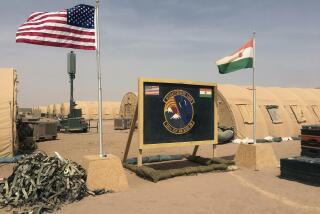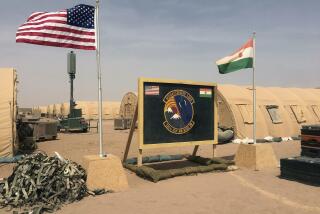Taylor Steps Down for Exile in Nigeria
MONROVIA, Liberia — Charles Taylor, an indicted war crimes suspect and onetime warlord, resigned Monday as Liberia’s president and went into exile, raising hopes for an end to the West African nation’s violent rebellion.
Waving a white handkerchief to onlookers and accompanied by his wife, two children and several close aides, Taylor boarded a chartered jet bound for Nigeria, which had offered him asylum. Many of his supporters who gathered at the airport wept as Taylor flew off after ceding power to his vice president, Moses Blah.
His departure coincided with a brief appearance of three U.S. warships carrying more than 2,000 Marines off this capital city’s shoreline. It was unclear if the troops would come ashore, and the vessels eventually moved farther out into the Atlantic.
Taylor’s exit is seen as a promising step toward ending 14 years of conflict that has devastated this country, which was settled by freed American slaves in the 19th century.
The test now will be whether the international community, led by peacekeepers from West African nations with the backing of the United States, will help enforce a cease-fire and forge lasting stability.
Monrovia’s hotly contested port, the corridor for much-needed humanitarian supplies, remains in rebel hands. And the many challenges ahead -- including demobilizing the rebel fighters, re-integrating them into society, rebuilding shattered infrastructure and restoring basic services -- could derail progress toward an enduring peace.
In neighboring Sierra Leone, where the United Nations took charge following that country’s recently ended civil war, the experiment of placing a troubled nation under virtual international receivership appears to have brought some benefit. Many here want their country to become such a protectorate.
Speaking at his resignation ceremony inside a velvet-draped hall in Monrovia’s executive mansion, Taylor described himself as a “sacrificial lamb” and a “whipping boy” and repeated previous comments that his departure was necessary for Liberia to have peace.
“Today is unique in that we take another step forward -- a step that should bring relief to the people of this nation,” Taylor said, addressing about 300 local and foreign dignitaries, including legislators and Western diplomats.
“Today for me is a day for moving forward,” he said. “We now put the past behind us.”
He ended his remarks with a vow: “I will be back.”
Taylor is accused of fueling conflict across neighboring West African nations and has been indicted by a U.N.-backed war crimes tribunal in Sierra Leone, where he is alleged to have sponsored a rebel movement whose calling card was hacking off the limbs of civilians. His government was also accused of smuggling diamonds and arms and was punished with an international arms embargo.
Leaders of the rebel movement Liberians United for Reconciliation and Democracy, or LURD, whose two-month assault on the capital has contributed to the deaths of more than 1,000 people and displaced thousands more, said they welcomed Taylor’s exit.
“This is a very big step toward peace in our country,” said Gen. Joe Wylie, a military advisor to LURD. “Taylor was a very negative character in Liberian politics. We are happy. We consider this to be a major victory.”
Taylor was pressured to resign by the Bush administration and West African leaders.
In Washington, Secretary of State Colin L. Powell said the commander of U.S. troops off Liberia would go ashore as early as today to discuss with Nigerian peacekeepers and international aid workers the steps needed to open Monrovia’s port to aid shipments.
State Department officials said they were pleased by Taylor’s departure and were ready to work with African countries in planning elections for a new government.
“Charles Taylor has been the catalyst for violence for some time in the region, so his departure is something we welcome,” spokesman Philip T. Reeker said.
Another U.S. official said Taylor had probably decided to leave because it was clear that his forces could not keep fighting and because African leaders had promised him a dignified exit. Those leaders deserve credit for pressuring Taylor to make the move, said the official, who requested anonymity.
As Taylor prepared to leave Monday, he urged the international community to assist his flagging nation.
“We beg you, we plead with you not to make this another press event,” Taylor said, adding that failure to make the proper commitment to Liberia could lead to another war and another president’s being forced to leave.
He accused the United States of supporting the rebels, adding that now that he was leaving, American officials could “call off their dogs.”
The vanguard of a West African peacekeeping force that is expected to grow to 3,250 troops has already brought a measure of stability to the capital. Nigerian soldiers have replaced Taylor’s largely undisciplined militias at several makeshift checkpoints in the city.
Washington had made Taylor’s departure from Liberia a precondition for helping the country. Last week, a liaison team of seven Marines went ashore to the headquarters of the regional peacekeeping force in Monrovia to help coordinate logistical support. A small number of other U.S. troops are in the capital to bolster security at the U.S. Embassy.
U.S. officials differed Monday on whether Taylor’s departure made it more likely that President Bush would send a peacekeeping contingent.
Pentagon spokesman Bryan Whitman said U.S. forces’ mission remained as described by Bush on July 25: to support West African peacekeeping forces. He said the president had not decided how to do that.
A defense official who asked to remain unidentified said there was “no set progression of events that would move more troops ashore. Just because Taylor leaves doesn’t mean anything. The question is whether the country will remain stable.”
The official said that if other African nations opted to send troops to Liberia to provide peacekeeping or humanitarian support, the U.S. would probably send additional liaison teams in with them. The official would not say how large those teams might be.
But another U.S. official said he believed that Taylor’s departure did increase the chances that Bush would send peacekeeping troops to help the city return to normal, perhaps soon.
This official noted that Bush had repeatedly made Taylor’s departure a precondition of any large troop deployment. He said that sending troops right away might be a good idea if it would speed Monrovia’s recovery.
He added that U.S. leaders would be watching to see if rebel troops and forces loyal to the government kept their commitments to disengage and give up territory they hold.
At the resignation ceremony in Monrovia, a gospel choir serenaded the guests, many of whom arrived at the mansion by 9 a.m. and waited for hours in a sweltering hall. Taylor had pledged to transfer power to Blah one minute before noon but was delayed at the airport, where he welcomed leaders from South Africa, Togo, Ghana and Mozambique, all of whom came to the gathering.
Ghanaian President John Kufuor told those in attendance that Liberia had embarked on a new era.
“It is our expectation that today the war in Liberia has ended and we are ushering in a period of peace,” Kufuor said. His country is hosting peace negotiations aimed at creating a transitional government in Liberia.
South African President Thabo Mbeki confirmed that his nation would contribute troops to the West African peacekeeping force.
Wearing a white safari suit and carrying his trademark staff, Taylor looked on dispassionately as Blah was sworn in. The vice president pledged to “faithfully, conscientiously and impartially discharge the duties and functions of the Republic of Liberia.”
After requesting a moment of silence for the casualties of Liberia’s war, Blah called for healing and reconciliation among all the nation’s people.
“There are no winners,” he said. “We are all losers.”
Blah is expected to remain in power until October, when a transitional government is to step in and steer the country to new elections. Plans for that interim administration are being finalized in Ghana.
Wylie, the rebel official, said his group would not oppose Blah -- a longtime ally of Taylor -- as long as he did not overstay his welcome. “We want him to stay for a very short period,” Wylie said. “Then we want an interim government to take his place.”
LURD controls a large portion of Monrovia, including the city’s lucrative port, which the rebels have refused to give up.
Sporadic gunfire echoed in the distance as excited civilians thronged to the beachfront to see the U.S. warships on the horizon. The ships -- the Iwo Jima, the Carter Hall and the Nashville -- carry Marines of the 26th Expeditionary Unit, which is based at Camp Lejeune, N.C.
While some Liberians said they would gladly welcome the Marines, others expressed disdain for what they saw as Washington’s intentional inaction.
“Why did they have to wait for people to die in order to come?” asked George Karneh, a local aid worker, as he gazed out at the ships. “What have they come to do -- take the dead bodies with them?”
Times staff writers Paul Richter and Esther Schrader in Washington contributed to this report.
More to Read
Sign up for Essential California
The most important California stories and recommendations in your inbox every morning.
You may occasionally receive promotional content from the Los Angeles Times.










